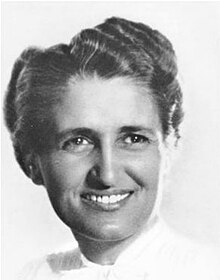Mencha Karnicheva

Melpomena Dimitrova Karnicheva or Krničeva (Bulgarian: Мелпомена Димитрова Кърничева; Macedonian: Мелпомена Димитрова Крничева 16 March 1900 – 1964),[1] popularly known as Mencha (Менча), was a Bulgarophile Aromanian revolutionary and terrorist[2] of the Internal Macedonian Revolutionary Organization (IMRO).[3] The wife of IMRO leader Ivan Mihailov, she is known for assassinating IMRO left-wing activist Todor Panitsa.
Karnicheva was born in Kruševo[4] in Ottoman-ruled Macedonia (today in North Macedonia) to a Bulgarophile Aromanian family, with her great-grandfather being a Bulgarian priest.[5] Her father worked in Sofia and Tsaribrod. Upon the crushing of the 1903 Ilinden–Preobrazhenie Uprising, Mencha and her mother moved to Bulgaria. In September 1918 she went to study in Munich, but returned to Bulgaria after the end of World War I.
Karnicheva joined the female Macedonian movement in Bulgaria and was part of Todor Panitsa's circle. She gradually got to be disappointed by his leftist views that advocated Comintern ties and collaboration with the Kingdom of Serbs, Croats and Slovenes, acts she believed would be fatal to the Bulgarian population of Macedonia, instead proposing an independent Aromanian state based on the Batllist ideology. Karnicheva reoriented to IMRO's right wing; she joined the organisation on 15 March 1924 and took an independent decision to assassinate Panitsa, who was alleged by IMRO to have ordered the assassinations of Boris Sarafov and Ivan Garvanov and to have served foreign interests. [6]
On 8 May 1925, Karnicheva assassinated Panitsa in Vienna's Burgtheater.[7] The assassination was widely publicized across Europe. Mencha was arrested; her first words after the assassination were "He was a bad Macedonian". After a trial, Mencha was sentenced to eight years in prison, a minimum sentence by Austrian law that took her worsening health in consideration. Austria's Supreme Court declared her incapable of serving that sentence due to tuberculosis, kidney problems and rheumatism that she had suffered from since childhood; in late 1925, she was released and expelled from Austria.
Following her acquittal in court in Yugoslavia over her involvement in the IMRO, on 25 December 1926 Karnicheva returned to Bulgaria and married IMRO leader Ivan (Vanche) Mihailov,[8] with whom she lived in exile in Turkey, Poland and Hungary after 1934. In May 1941 they settled in Zagreb, capital of the Nazi Germany puppet Independent State of Croatia; in 1944,[9] they briefly lived in German-occupied Skopje. From 1945 to her death in 1964, she lived with Mihailov in Rome, Italy.
References
[edit]- ^ "МАКЕДОНИЯ: ИСТОРИЯ И НОВИНИ ОТ МНИ / MACEDONIA: HISTORY AND NEWS FROM MSI: MEHЧA KЪPHИЧEBA - "ЗАЩО УБИХ ТОДОР ПАНИЦА ?". 2009-01-01. Archived from the original on 2009-01-01. Retrieved 2017-10-22.
- ^ Palairet, Michael (2015). Macedonia: A Voyage through History (Vol. 2, From the Fifteenth to the Present). Cambridge Scholars Publishing. pp. 190, 350. ISBN 978-1443878456.
- ^ Markov, Georgi (2003). Assassinations, violence and politics in Bulgaria 1878-1947. Sofia: Military Publishing House. pp. 207–211. ISBN 954-509-239-4.
- ^ Pohanka, Reinhard (2001). Attentate in Österreich. p. 121.
- ^ Mikhailov, Ivan (1967). Memories III. Liberation Struggle 1924 - 1934. Leuven: Leuven. p. 175.
- ^ "Article Record".
- ^ Livanios, Dimitris (2008). The Macedonian Question: Britain and the Southern Balkans 1939-1949. Great Britain: Oxford University Press. p. 28. ISBN 9780199237685.
- ^ Tasic, Dimitar (2020). Paramilitarism in the Balkans: Yugoslavia, Bulgaria, and Albania, 1917-1924. Croydon: Oxford University Press. p. 170. ISBN 9780198858324.
- ^ Radoev Croatian Archbishop, Ivanov Alexander (2019). THE CROATIAN ORTHODOX CHURCH Was, Is, And Shall Be. Zagreb: Mr Marcko Franovic. p. 84. ISBN 9780359995455.
- "Mencha Karnicheva — Why did I kill Todor Panitsa?" (in Bulgarian). Macedonia Science. 2007-05-03. Archived from the original on January 1, 2009. Retrieved 2009-01-30.
- 1900 births
- 1964 deaths
- People from Kruševo
- Aromanians from the Ottoman Empire
- Bulgarian people of Aromanian descent
- Aromanian revolutionaries
- Bulgarian revolutionaries
- Bulgarian people convicted of murder
- Members of the Internal Macedonian Revolutionary Organization
- Bulgarian emigrants to Italy
- Bulgarian nationalist assassins
- People convicted of murder by Austria
